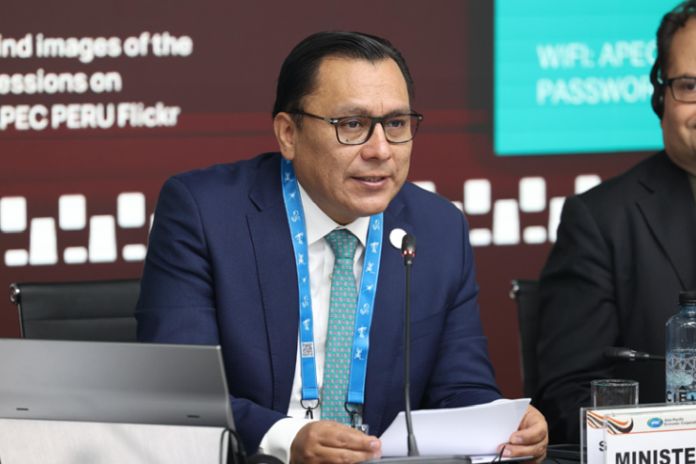- Issued by the 30th APEC Small and Medium Enterprises Ministerial Meeting
PUCALLPA, Peru – Committed to addressing the significant barriers in accessing global markets, formalizing operations, and adopting new digital technologies, APEC ministers responsible for micro, small, and medium enterprises across the Asia-Pacific convened in Pucallpa, a gateway city to Peru’s Amazon region, to further empower this important economic sector.
Micro, small and medium enterprises (MSMEs) account for over 97 percent of all businesses and employ over half of the workforce across APEC economies. Recognizing this significant contribution, ministers deliberated on actions and policy levers that will empower MSMEs to overcome obstacles and enhance their participation in global value chains.
“This year, we have defined clear priorities: to promote the integration of MSMEs into global markets, to support their transition to formality; and to promote their digitalization and innovation for sustainable development,” said Sergio González, Peru’s minister of production, who chaired the 30th APEC Small and Medium Enterprises ministerial meeting on Friday.
“This meeting, which is being held in the heart of our Peruvian Amazon, represents an invaluable opportunity to strengthen our cooperation for the benefit of MSMEs, which are fundamental to our economies,” minister González added.
Minister González urged his counterparts to ensure that policies and actions taken by governments allow MSMEs to grow in an inclusive, digital and sustainable way, stressing that this will lead the way to greater prosperity in the Asia-Pacific region.
Addressing one of the largest challenges for MSMEs, ministers exchanged views on ways to support the transition from the informal to formal economy, with a focus on expanding access to financing and institutional support.
Ministers also considered efforts to enhance cooperation between MSMEs and larger companies, as well as collaboration with economic stakeholders to help them overcome market risks, looking at training programs and policies to facilitate the green transformation of MSMEs.
“We are constantly reminded that MSMEs are the backbone of our economies. Yet, there is so much we need to do empower them,” said Dr Rebecca Sta Maria, the executive director of the APEC Secretariat. “Empowering MSMEs translates into providing them with the skills and tools necessary to support them. Herein is APEC’s strength.”
“MSMEs will need to have the requisite skills, including marketing technical knowledge, familiarity with regulatory requirements, or the ability to translate commercial and product information into the language of buyers,” Dr Sta Maria added.
Digital tools and emerging technologies have been recognized as key tools to enhance MSMEs’ productivity and access to broader markets, the meeting explored measures to promote the use of digital platforms, improve technological resources, and provide more specialized training.
“Business continuity of MSMEs must include ensuring digital preparedness and address the digital gaps within and between regions. This is more an imperative now with the increasing use of AI and machine learning,” Dr Sta Maria concluded. “Not keeping up with these developments means we risk exacerbating the digital divide.”

